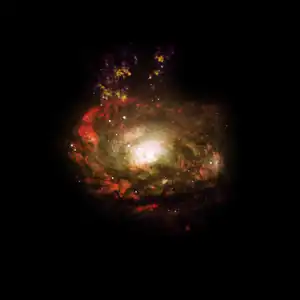Circinus Galaxy
The Circinus Galaxy (ESO 97-G13) is a Seyfert galaxy[2] in the constellation of Circinus. It is located 4 degrees below the Galactic plane, and, at a distance of 4.0 Mpc (13 Mly), is one of the closest major galaxies to the Milky Way.[3] The galaxy is undergoing tumultuous changes, as rings of gas are likely being ejected from the galaxy. Its outermost ring is 1400 light-years across while the inner ring is 260 light-years across. Although the Circinus galaxy can be seen using a small telescope, it was not noticed until 1977[4] because it lies close to the plane of the Milky Way and is obscured by galactic dust. The Circinus Galaxy is a Type II Seyfert galaxy and is one of the closest known active galaxies to the Milky Way, though it is probably slightly farther away than Centaurus A.
| Circinus Galaxy | |
|---|---|
 A Hubble Space Telescope (HST) image of the core of the Circinus Galaxy. | |
| Observation data (J2000 epoch) | |
| Constellation | Circinus |
| Right ascension | 14h 13m 9.9s[1] |
| Declination | −65° 20′ 21″[1] |
| Redshift | 426 ± 25 km/s |
| Apparent magnitude (V) | 12.1[1] |
| Characteristics | |
| Type | SA(s)b[1] |
| Size | 14.85 kpc × 6.09 kpc (48,430 ly × 19,860 ly) (diameter; 2MASS K-band total isophote)[1][lower-alpha 1] 10.38 kpc × 5.19 kpc (33,855 ly × 16,928 ly) (diameter; ESO 90% total B-band)[1][lower-alpha 1] |
| Apparent size (V) | 6.9′ × 3.0′[1] |
| Other designations | |
| ESO 97-G13,[1] LEDA 50779 | |
Circinus Galaxy produced supernova SN 1996cr, which was identified over a decade after it exploded. This supernova event was first observed during 2001 as a bright, variable object in a Chandra X-ray Observatory image, but it was not confirmed as a supernova until years later.
The Circinus Galaxy is one of twelve large galaxies in the "Council of Giants" surrounding the Local Group in the Local Sheet.[5] One object is possibly a satellite of the Circinus Galaxy, known as HIZOA J1353-58. HIZOA J1353-58 was discovered in a survey of neutral hydrogen (H I) and is located within the Zone of Avoidance.[6]
Notes
- The quoted diameters in this infobox was based on NED's provided scale of 15 pc/arcsec multiplied with the given angular diameters.
References
- "Detailed Information for Object ESO 97-G13". NASA/IPAC Extragalactic Database. Retrieved September 13, 2023.
- "NAME Circinus Galaxy". SIMBAD. Centre de données astronomiques de Strasbourg. Retrieved 2007-04-20.
- Maiolino, R.; Krabbe, A.; Thatte, N.; Genzel, R. (1998). "Seyfert Activity and Nuclear Star Formation in the Circinus Galaxy". The Astrophysical Journal. 493 (2): 650–65. arXiv:astro-ph/9709091. Bibcode:1998ApJ...493..650M. doi:10.1086/305150. S2CID 16365899.
- Inglis, Mike (2004). Astronomy of the Milky Way: Observer's Guide to the Southern Sky. New York, New York: Springer. p. 103. ISBN 978-1-85233-742-1.
- McCall, Marshall L. (29 April 2013). "A Council of Giants". Monthly Notices of the Royal Astronomical Society (published 10 March 2014). 440 (1): 405–426. arXiv:1403.3667. Bibcode:2014MNRAS.440..405M. doi:10.1093/mnras/stu199.
- Staveley-Smith, L.; Kraan-Korteweg, R. C.; Schröder, A. C.; Henning, P. A.; Koribalski, B. S.; Stewart, I. M.; Heald, G. (2016). "The Parkes H I Zone of Avoidance Survey". The Astronomical Journal. 151 (3): 52. arXiv:1602.02922. Bibcode:2016AJ....151...52S. doi:10.3847/0004-6256/151/3/52. S2CID 54665552.